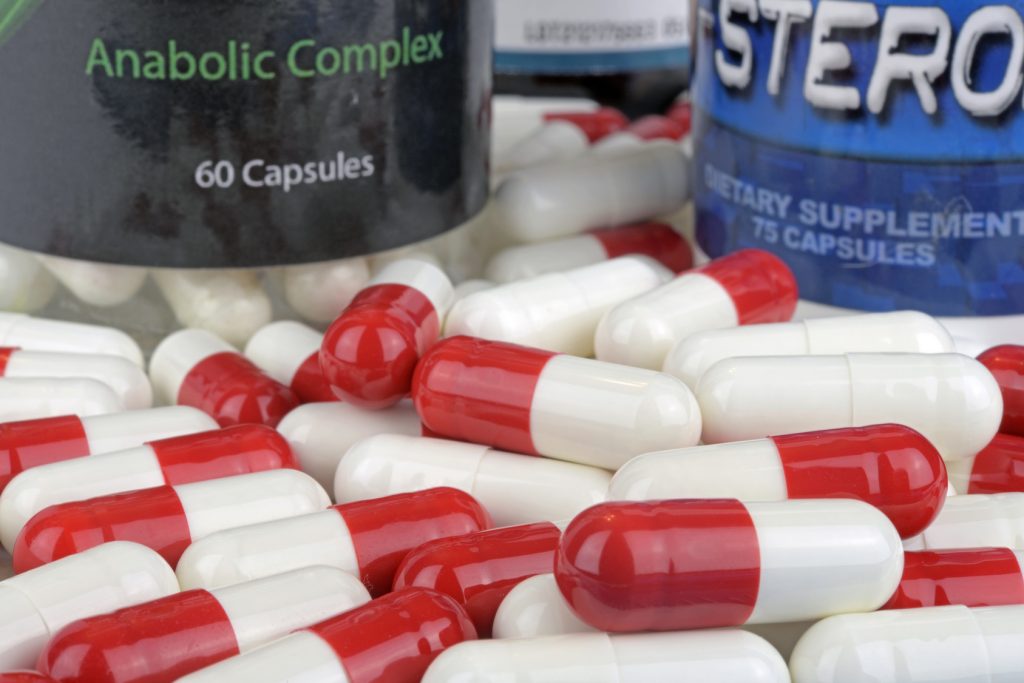Looking for ways to beef up lean muscle mass while getting sliced, diced and shredded? There are tons of products you can take to energize workouts and change your body composition. Outside of the dangerous and ill-advised steroid route, there are two notable kinds of ingestibles that have long been used to achieve “peak physical performance” goals – prohormones and testosterone boosters.
While these two have plenty of differences, they do share one common element–they both encourage higher levels of testosterone, that renowned hormone linked to all things commonly considered manly: Muscle mass, strength, sex drive, erectile function, and more.1
Okay, then what makes testosterone boosters different from prohormones? And why is one easily accessible, while the other is considered a banned substance? The distinction lies in how each works, known as the “mechanism of action” in scientific circles:
- T-boosters cooperate with the body to elevate the natural production of testosterone.
- Prohormones are hormonal precursors that are used to magnify the effects of hormones already in the body, but many are classified as synthetic.
Both T-boosters and prohormones are commonly believed to be effective for building lean muscle mass… but only one of these options carries with it substantial risks that warrant careful consideration. Let’s take a closer look at both prohormones and testosterone boosters.
Prohormones
What Are Prohormones?
Prohormones aren’t actual hormones; they are hormone precursors. Depending on their source, these “almost hormones” can be either natural or synthetic, and, like anabolic steroids, they act as androgens (male sex hormones) that may have physical performance-enhancing, or ergogenic, effects.2
Although glands in the endocrine system may produce some prohormones, most kinds available on the market are not natural. In either case, they are structurally similar to testosterone, and their activity in the body may lead to increased T levels. In fact, at a glance, the chemical compositions of testosterone and, say, the prohormone androstenedione appear closely alike.3 Their subtle—yet crucial—distinctions, though, make all the difference in the world.
“Are prohormones legal, or what?”
Nope. That’s another key distinction between prohormones and T-boosters. For years, prohormones were available due to a loophole. But on December 13, 2014, President Obama signed into law the Designer Anabolic Steroid Control Act of 2014–which effectively closed all loopholes and re-categorized prohormones as a “banned substance.”
This major regulatory change includes specific language that now bans lab-created substances that are chemically similar to steroids (even if they’re NOT steroids) that are intended to stimulate muscle growth or cause testosterone-like effects… which is the very definition of prohormones.
It is interesting to note the Designer Anabolic Steroid Control Act of 2014 has language that specifically excludes herbal and botanical compounds from the ban, which almost seems to be presenting natural T-boosters as an official legal alternative to illegal prohormones.
How Do Prohormones Work?
![By Ed (Edgar181) (Own work) [Public domain], via Wikimedia Commons](https://supplementsinreview.com/wp-content/uploads/2015/07/5-Androstenedione.svg_-300x231.png)
When produced by the body, androstenedione acts as an androgenic steroid and originates from the adrenal glands and the testicles (in men) or ovaries (in women). After it is released into the bloodstream, it is quickly converted to testosterone, though it may become estrogen under some conditions.
The German Olympians who used andro found that it caused a swift elevation in testosterone levels, but, due to its brief half-life, this rise typically only lasted a few hours. This effect, like those of anabolic steroids, has been associated with an increase in muscle mass and overall athletic performance, as well as a spike in positive mood and aggression.4
The ideal results of andro, like that of anabolic steroids, mean that it and other prohormones could yield a 5% to 20% boost in strength, as well as an increase in general lean body mass.5
But let’s rewind a sec, and go back to the phrase “brief half-life.” This means that andro and other prohormones may not stay in the body for long. The substances may not turn up on drug tests, but this also means that they may not be retained long enough to actually work. 6 In fact, plenty of research seems to indicate exactly that–apparently, andro and other prohormones just aren’t effective.7
Mark McGwire's Andro Error
Does andro sound familiar, sports fans? If so, it’s likely because baseball superstar Mark “Big Mac” McGwire used the prohormone during his impressive major league run. At the time, it was legal and sold over the counter, but eventually its status shifted. In 1999, McGwire denounced andro and publicly stated that he’d stopped taking it. Eleven years later, he expressed regret about that point in his career, and admitted that other steroid use coincided with his andro days. Although prohormones aren’t quite anabolic steroids, the intended effects – and the stigma – are very similar.
Side Effects of Prohormones
Like anabolic steroids, prohormones, due to the biological changes that they potentially instigate, may have pronounced side effects. These adverse outcomes have been pinpointed in a number of studies, which indicate that the unfortunate effects of prohormones may involve:
- Altered hormonal markers: These biological shifts can lead to abnormal and unhealthy surges in serum estrogen.
- Heart problems: Andro use in particular has been linked to significantly lowered levels of high-density lipoproteins (a.k.a. “good cholesterol”) and, consequentially, cardiovascular disease.
- Cancer risk: The drastic change in estrogen amounts caused by prohormones has been associated with pancreatic and prostate cancer.
And there aren’t just internal negative results – some forms of prohormones, including androstenedione, have been tied to numerous unwanted issues involving outward appearance, such as breast enlargement, hair loss, oily skin, and acne.8 These effects are more than just unmasculine, they’re downright unsightly.
Who Takes Prohormones?
![Mark McGwire, 1989. By Silent Sensei from Santa Cruz, USA (Oakland A's) [CC BY 2.0], via Wikimedia Commons](https://supplementsinreview.com/wp-content/uploads/2015/07/Mark_McGwire_1989_cropped.jpg)
If prohormones do work–and that seems questionable, given the many studies to the contrary–the same appeal as anabolic steroids stands: Guys want to get leaner and stronger as quickly as possible. What remains are the considerable side effects. And, since prohormones have gone from frowned upon to straight-up illegal, athletes risk serious penalties by taking them.
The Bottom Line on Prohormones
Prohormones aren’t anabolic steroids, but they act like anabolic steroids and are treated accordingly. They pose serious health risks, and they’re now banned. If you’re going to avoid steroids–and you should–then you should also steer clear of prohormones, too.
Testosterone Boosters
![Fenugreek plant, one of many natural T-boosters. By Malyadri (Own work) [CC BY-SA 3.0], via Wikimedia Commons](https://supplementsinreview.com/wp-content/uploads/2015/07/Fenugreek_leafs-1024x683.jpg)
What Are Testosterone Boosters?
Prohormones tend to come from artificial sources, while T-boosters aid in raising and maintaining the body’s naturally occurring testosterone. Supplements may consist of one active ingredient, but generally offer a stack of testosterone boosters in a formula, including vitamins, minerals, and various botanically derived compounds.
How Do Testosterone Boosters Work?
T-booster complexes, unlike prohormones, affect various body pathways that assist with elevating blood testosterone levels in numerous ways. Components of T-booster formulas may:
- Halt enzymes that convert testosterone to estrogen
- Provide raw materials for testosterone production9
- Signal testes to release additional testosterone10
While supporting the natural creation of testosterone, these products may encourage its wide-ranging benefits, which can extend to increases in:11
- Libido
- Sperm quantity and quality
- Mental focus
- Cardiovascular health
- Energy levels
- Bone density
Who Takes Testosterone Boosters?

Guys in the early stages of manhood often have excess testosterone to burn and may not have T-boosters on their radar.
During the aging process, however, the body experiences a progressive testosterone decline, typically starting around age 30-40.12 These lower T levels have been associated with having less energy, a fading sex drive, and an increase in belly fat.
With these issues facing 40+ men, the priority in seeking elevated testosterone often isn’t to get ripped – it’s a way of recapturing your more youthful self. For guys with vitality and energy on their mind, a natural lift in testosterone can come from T-boosters.
The Bottom Line on Testosterone Boosters
Due to their natural–and often herbal–sources, T-booster supplements are generally well tolerated by the body. As an alternative to steroids, they present a mellower version of the same invigorating effects, but without the bad side effects. Oh, and they’re LEGAL, too!
Prohormones vs. Testosterone Boosters: A Clear Choice
Going with T-boosters is the obvious call. After all, what’s the point in taking the “steroids lite” of prohormones? Testosterone boosters can improve bodybuilding, while helping to work against the effects of aging and revitalizing energy levels and sex drive. And with much more reputable ingredients, it’s quality and vitality all the way with T-boosters.
References

Leave a Reply